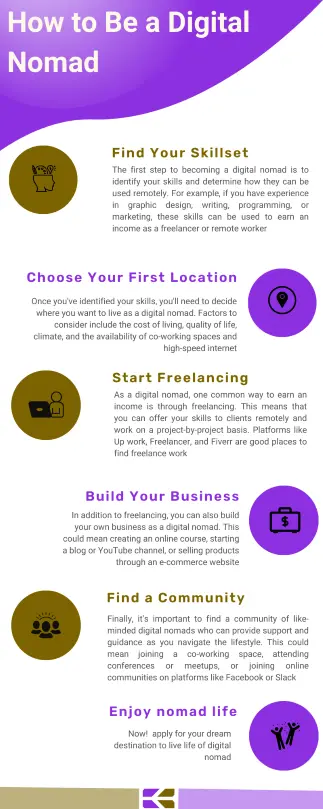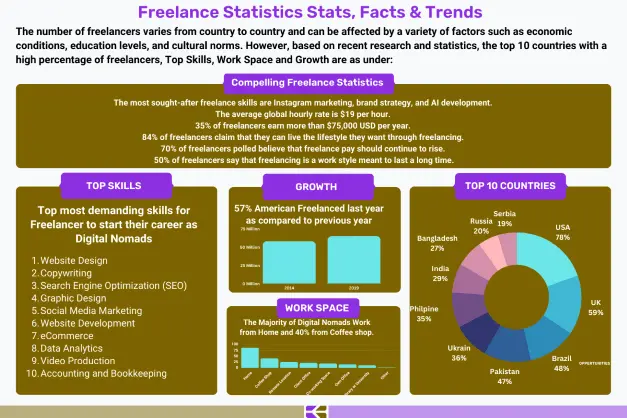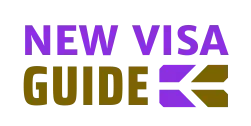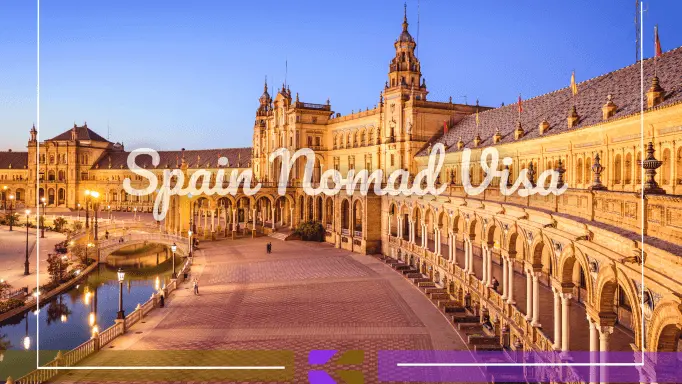Countries Offering Digital Nomad Visas
Digital Nomads
Digital Nomads are individuals who love to travel freely around the world while performing their job remotely using the internet and technology, such peoples work remotely in temporary co-working spaces, public libraries, cafes, hotels, and temporary houses using Wi-Fi, smart devices, and mobiles to access the internet.
The majority of them are programmers, content creators, developers, and designers. According to researcher data in 2020, 10.9 million American people registered themselves as digital nomads, a surprising increase number of 49% compared to 2019. A research study confirms a huge demand and increase in remote workers only in United States of America.
The first digital nomad was Steve Roberts, who started work remotely in 1983 for a popular computing publisher; the publisher described him as a “high-tech nomad”.
What is Nomad Visa?
A Nomad visa is introduced for individuals who work from home, either as employees of a company or as self-employed individuals.
Nowadays highly increasing demand for visas due to remote work. That’s why many countries are trying to attract foreign talents to work in their country by obtaining Nomad Visa.
It is suitable for freelancers, professionals, and entrepreneurs who are willing to work remotely and don’t need physical presence to perform his/her job.
The main reason for the increase in demand for nomad visas is due to COVID-19 Pandemic. Multiple countries like UAE, Portugal, Spain, Germany, Greece, Italy and Indonesia start to change their policies and programs as a result of the pandemic.
Remote Workers vs Digital Nomads
During the COVID-19 lockdown dramatic increase in demand for remote workers in 2020. Many big companies allowed their workers to work from home and start monitoring their work indirectly. While the digital nomad program allows remote workers to stay in a foreign country to perform their job for one year.
How to be a Digital Nomad
- First! Find out skills and define how to use that skills remotely. Digital Nomads means remote working, like programming, Digital marketing, copywriting, e-commerce store running, graphic designing, coding, and business planning.
- Learn skills and experience in your desired field. Join coaching classes, community, and any institute to build your strong portfolio before entering digital nomad.
- Keep a budget for your digital nomad work cycle. It is necessary to keep in mind the expenses of living in a different country, traveling, and technology gadgets.
- Build an online presence. Create a portfolio website and profile on LinkedIn and other social media platforms
- Sort out the first location. Research and evaluate the country to set up your nomad life, and consider safety and accessibility for life.
- Complete Documentation. Get your visa and required documents before traveling.
- Find a residence to live in. Get an apartment or guest house according to your budget and lifestyle
- Start search clients and networks. Try to get work as soon as possible and start working with them and establish a network.
- Make a schedule for your work and leisure time.
- Be in touch with other digital nomads for support and advice, and regularly join meet-ups, conferences, and meetings with nomads.
- Freelance Platform. Many platforms are available to work remotely, but Up work and Fiverr are effective sources for digital nomads to get projects regularly.
- Try to get the top-rated badge to gain trust for maximum work for a stable income, and deliver quality work with value addition. Focus on quality work and beyond expectations to build trust and a portfolio of your work.
- Build a digital marketing agency and team. With team collaboration, you can perform better and earn more.
- Find out different team members with high demand skills to expand your work portfolio and get work.
- Keep on Learning new skills and incorporate these in your current portfolio and share these new skills with your team and colleagues.

By following these points, you can begin your journey as a digital nomad and enjoy the freedom and flexibility of working remotely while experiencing different cultures and hassle free lifestyles around the world with excellent perks and benefits with your family.
Freelancer Platforms and Statistics
There are numerous platforms available that target different marketplaces and expertise.
PLATFORMS
STATISTICS

These are some examples of marketplaces there are also much more available to choose from. Upwork and Fiverr are the best freelance marketplaces with a range of services and options for the freelancer to work remotely. Here is the detail of both marketplaces for digital nomads to learn and earn opportunities to become a remote worker.
Upwork
- Upwork is the best and largest network place for freelancers and businesses around the world.
- Marketplace allows business owners to find, hire and collaborate with top and talented individuals with different skills, from Graphic design to customer service.
- Upwork was established in 2015 and grew into a global marketplace with over 12 million remote workers and over 5 million business clients, as per the company’s official data.
- The platform is friendly to start for both freelancers and business owners. As a business owner, you have to post a job with requirements and freelancers submit their proposals to get that job according to their skill and experience.
- Platform also has a messaging and meeting setup for both parties to discuss and conduct interviews as per requirements.
- The payment system of Upwork is excellent as it holds the payment for clients as an escrow method and releases the payment after the completion of the project.
- Upwork also has tracking software to track the work of remote workers to build the trust of the client as a client can track work progress and instruct according to the project.
- Start applying for jobs through connects to submit your proposals and get a project as per your expertise.
Fiverr
- Fiverr is another marketplace for digital nomads to start their work remotely and earn according to their skills and experience with excellent projects from throughout the world.
- Platform was established in 2010 and become one of the biggest platforms in the world.
- Fiverr also works as Upwork with creating a profile for both business and remote workers.
- One of the big difference is the types of services offered by Fiverr as Fiverr host a wide range of services and clients from all skillset.
- Another main difference is the price module. Upwork offers remote workers to set their prices according to their skill and experience, but Fiverr operates as a project based pricing module.
- Fiverr access their remote worker with many tools and features to enhance their skill to perform tasks, like data insights, analytics, and promotional tool to grow gigs.
- Overall Fiverr is the best place for businesses and remote workers to fulfill requirements at a reasonable price with quality work.
- Just sign up for their official web and create your profile with complete details, like personal detail, Profile photo, qualification, skills, and experience with an attractive portfolio.
Upwork Vs Fiverr
| Features | Upwork | Fiverr |
|---|---|---|
| Payment Structure | Hourly or fixed-price projects. | Fixed-price projects with optional add-ons. |
| Pricing | Upwork charges 20% for the first $500 earned from a client, then 10% for the lifetime of the client. | Fiverr charges 20% of the total transaction value up to $500, then 5% for transactions above $500. |
| Quality control | Freelancers are vetted and have to go through a rigorous application process. | Freelancers have to pass a skills test before creating a gig. |
| Communication Tool | Built-in messaging system, video conferencing, and file sharing. | Built-in messaging system, live chat, and file sharing. |
| Job Volume | Large volume of jobs and clients. | Large volume of jobs and clients. |
| Client Support | Customer support available 24/7 | Customer support available 24/7 |
Legality for Nomad Visa Holders
Digital nomads generally come from more developed nations with passports that allow them to travel freely. Therefore, many people prefer to travel on a travel visa; working on a travel visa is technically illegal and controversial.
Benefits of a Digital Nomad Visa
- There are a lot of benefits for nomad visa holders, such as access to co-working places and many other facilities like support for their remote work and providing a hassle-free environment with free internet facilities, and other basic needs.
- Some countries are also offering health facilities to visa holders. The requirements and benefits depend on their rules and regulations as per their law.
- Digital nomads are also beneficial for employers, as a study confirms that there is a good relationship between employers and remote workers, who freed from the limitations of geographic showed an increase in productivity of up to 4.4%.
Disadvantages of a Digital Nomad Visa
- Feelings of loneliness are a big issue for a digital nomad to sort it as they impact more on their life, followed by burnout.
- Other challenges are maintaining insurance for health globally, abiding by different countries’ laws, taxes and getting a work visa, and relationships with family and friends. Visa holders have rarely access to retirement benefits.
- Time zone difference is also a challenge to completing tasks and jobs, as well as a reliable internet connection.
- Stress. Because the way of life is almost always more stressful than staying put, being a digital nomad is not for everyone.
- Stability issues.
- Maintaining a work-life balance is difficult.
- You require Wi-Fi.
Pros and Cons of a Digital Nomad Visa
Pros
Cons
Digital Nomad Visa vs E-Residency
Digital nomad visas and e-residency both are different programs to attract foreign talent. There are some differences between both programs while seeming similar.
A Digital nomad visa is for remote workers or freelancers to perform their tasks while traveling to another country. The demand for remote workers surprisingly increased after the COVID-19 pandemic, as many businesses get work done remotely by their employees during and after the pandemic.
On the other hand, e-residency is a digital identification program launched by the Government of Estonia. E-residency permit allows entrepreneurs and remote workers to establish their business and run it remotely in the country. In e-residency, a digital card is issued to individuals for business use, government services, and basic online needs. Through e-residency, you are not entitled to physical residence in Estonia.
The main difference is that a digital nomad visa allows you to get physical residency in the offering country, while e-residency only allows you to conduct online business only through it.
That’s why a digital nomad visa is the best program for remote workers and freelancers to get residency in a new country with excellent perks, rich and mixed culture with luxury destinations mentioned as under.
Countries Offering Digital Nomad Visa
Nomad visas are available in the following countries:
Antigua and Barbuda
Antigua and Barbuda introduced a digital nomad visa called the Nomad Digital Residence in 2020. Visa holders can get access to live and work remotely in the country for two years.
Anguilla
Anguilla allows digital nomads to live there for up to 12 months and avail of all facilities within the country. Just $2000 you have to pay for your travel fee.
Applicant must submit their documents with proof of employment and other required papers to get a visa. The process will complete within 2 weeks after applying.
Argentina
Argentina introduced a short visa valid for six months with an additional extension of six months for remote workers to stay in the country to perform their jobs.
Bermuda
Bermuda announced a digital nomad visa called “Work from Bermuda.” There was previously a residency visa program for remote workers which is replaced with “Work from Bermuda”.
Brazil
Under Resolution 45, Brazil introduced a digital nomad visa for foreign individuals either self-employed or as company employees. It allows foreigners to apply for a visa that allows them to work remotely for 180 days in a one-year period. The Visa is valid for one year and can be renewed for a further year.
Cayman Islands
Cayman Island announced a visa program for foreign remote workers to stay in the country. If they have an employment letter from the company outside the Cayman Island and salary should be a minimum of $100,000 per annum.
Cabo Verde
Cabo Verde also known as Cape Verde an Island with beautiful sea sides, and a pleasant climate in West Africa has launched a digital nomad visa.
The visa allows digital nomads to live and work there for up to one year. Eligible individuals must have remote work and earn proof of a minimum of $5000 with health insurance and accommodation for living in the country.
The country’s lifestyle is very cost-effective and reasonable for remote workers and freelancers with rich history and culture. One of the best destinations and an affordable country to explore.
Costa Rica
Costa Rica also passed a Resolution for digital nomads and their families to stay and work in the country for one year and the visa further can be extendable for one year.
The only requirement is for applicants to have a monthly income of $3000 per month, if you applying with a family then the minimum salary should be $5000 per month.
Croatia
In 2021, Croatia started a visa program for remote workers from outside Europe. The holder can stay in the country for a year without paying income taxes to the government of Croatia.
Czech Republic
The Czech Republic is a beautiful European Country that also launched a nomad visa for remote workers and freelancers known as a “Long-Term Visa for Remote” to live and work there for up to Six months.
Applicant must meet requirements like being self-employed, a minimum earning equivalent to at least three times higher compare to salary in the Czech Republic.
Individuals must have health insurance, proof of accommodation, and no criminal record.
The Czech Republic is the most beautiful and rich culture country in the heart of Europe.
Dominica
Dominica, a Caribbean Island has introduced a digital nomad visa to attract remote workers called the “Work in Nature (WIN) extended stay visa”.
This visa allows the holder to live and work in the country for up to 18 months. To get access to the permit you have to show an income of $50,000 per year and health and travel insurance with no criminal background.
After getting a visa you can avail excellent perks such as discounts on selected outlets, hiking, diving, and surfing.
Estonia
In 2020, Estonia announced a visa program called the digital nomad program for remote foreign workers to work inside for up to one year for their employer.
Visa applicants must be able to show that they have a job or business that allows them to work remotely for an entity.
Georgia
In 2020, Georgia announced a visa program “Remotely from Georgia “which allows individuals to do their tasks remotely for up to one year from 95 countries.
Germany
Germany also granted a digital nomad visa for remote workers to live and work in the country for up to three months which can be extended up to three years.
Hungary
The White Card a residency program was issued for remote workers to live and work for entities outside the country. It allows the visa holder to stay in the country for up to a year with an additional expansion of one year.
Iceland
Iceland signed an agreement plan to issue foreign nationals a digital nomad visa for up to six months.
Indonesia
Recently, Indonesia introduced a digital nomad visa for remote workers to live and work in the country for up to 5 years totally tax-free. The Ministry of tourism hopes to attract up to 4 million digital nomads, which is a huge number of foreigners.
Italy
Italy in 2022, announced that it would be introducing a digital nomad visa for remote workers. Details of the visa still remain unknown.
Latvia
Latvia introduced new rules to its immigration law to allow foreign nationals to work either as self-employed or foreign-registered companies in the country for up to one year.
Malta
Malta planned to open visas for digital nomads in 2021, for foreign individuals for up to a year.
Mauritius
Mauritius Government expands premium visas to digital nomad visas for remote workers to stay inside for up to one year.
Mexico
Mexico announced a visa for remote individuals to stay and work inside the country.
Which is called a premium travel visa for remote workers and freelancers. Eligibility for the visa is to show earning an income of $1500 per month with valid travel and health insurance and proof of accommodation to stay in the country. Retirement individuals can also avail of this opportunity to get a visa who meet the minimum income requirement for a visa.
Mauritius is the best place with high quality of life, warm weather, luxury beaches, and a low crime rate.
A premium Travel visa can be a good option for digital nomads for a safe and stable country.
Norway
Norway also launched “The independent contractor visa” for online workers to live and work in Norway. Submit all the documents to the nearby embassy to get access to a visa.
Portugal
In October 2022, Portugal’s Ministry stated that it would be allowing foreigners to submit applications for digital nomad visas.
Romania
The six-month visa program was approved by the Romanian parliament for digital nomads, which can be further extended up to six months.
If digital nomads have valid proof of employment for at least 3 years from the employer.
Seychelles
Seychelles is an iconic and safe country with rich history and diverse influence cultures, including Asian, African, and European nations.
Seychelles also introduced a digital nomad visa called “Workcation Permit” that allows remote workers to live and work for up to one year.
To be eligible for Workcation Permit, individuals have a remote job, accommodation, and a minimum income of $50,000 per year.
Spain
A start-up law has been introduced in 2021, in Spain which allows foreigners to work in the country for up to 5 years and get special relaxation in taxes.
South Africa
South Africa also announced in March 2022, a visa plan to facilitate digital nomad individuals to stay and work in the country for 3 months.
Taiwan
Taiwan also launched the “Employment Gold Card” that allows foreign entrepreneurs and professionals to live and work in Taiwan for up to three years.
An eligible applicant must have an offer letter from a Taiwanese Company or special talent and earn proof of $5600 per month with no criminal record.
United Arab Emirates
In October 2020, UAE launched a visa called “Green Visa “for remote workers to attract them to stay and work in Dubai.
A remote worker with a salary of $5,000 per month will be eligible for Green Visa.
There are 50 regions offering temporary remote worker programs as of November 2022. In addition to the 30 countries listed below, the following countries also accommodate digital nomads.
Among the countries are The Bahamas, Curacao, Cyprus, Albania, St. Lucia, Grenada, Panama, Belize, Brazil, Ecuador, Sri Lanka, Thailand, Malaysia, Namibia, North Macedonia, Serbia, Montserrat, Montenegro, Columbia, and South Africa.
Requirements for Digital Nomads
A nomad visa may also be subject to some general eligibility criteria besides the specific requirements of each country.
These may include:
- Age should be at least 18 years old
- A valid passport with a validity period of at least six months
- No criminal record
- Having a job or business that allows you to work remotely
- Sufficient financial resources to support yourself during your stay there
- It is important to note that nomad visas are not the same as permanent residence visas, and they do not provide a path to citizenship or permanent residence in the country where they are issued.
- Nomad visa holders are expected to maintain an itinerant lifestyle and leave the country after the visa expires
Key Notes
The Demand of digital nomads is increasing day by day in recent years, especially during and after COVID-19 pandemic.
To perform your work remotely while traveling has changed the way of working for many people, allowing them to enjoy different rich cultures and lifestyles of another country.
To be eligible for digital nomad you have to work on a skill that allows you to work as a remote worker or as freelancer. If you don’t have any skill just learn from any authentic institute and start providing your service of that particular service on different platforms like Upwork, Fiverr, Freelancer and many more.
Start searching your first destination for living and working there. There as many 50 plus countries available that are giving access of digital nomad visas to remote workers or freelancers. Complete your documentations as per country requirements and apply for a digital nomad visa.
Enjoy the beautiful hassle free life with digital nomad visa according to your own desires.







